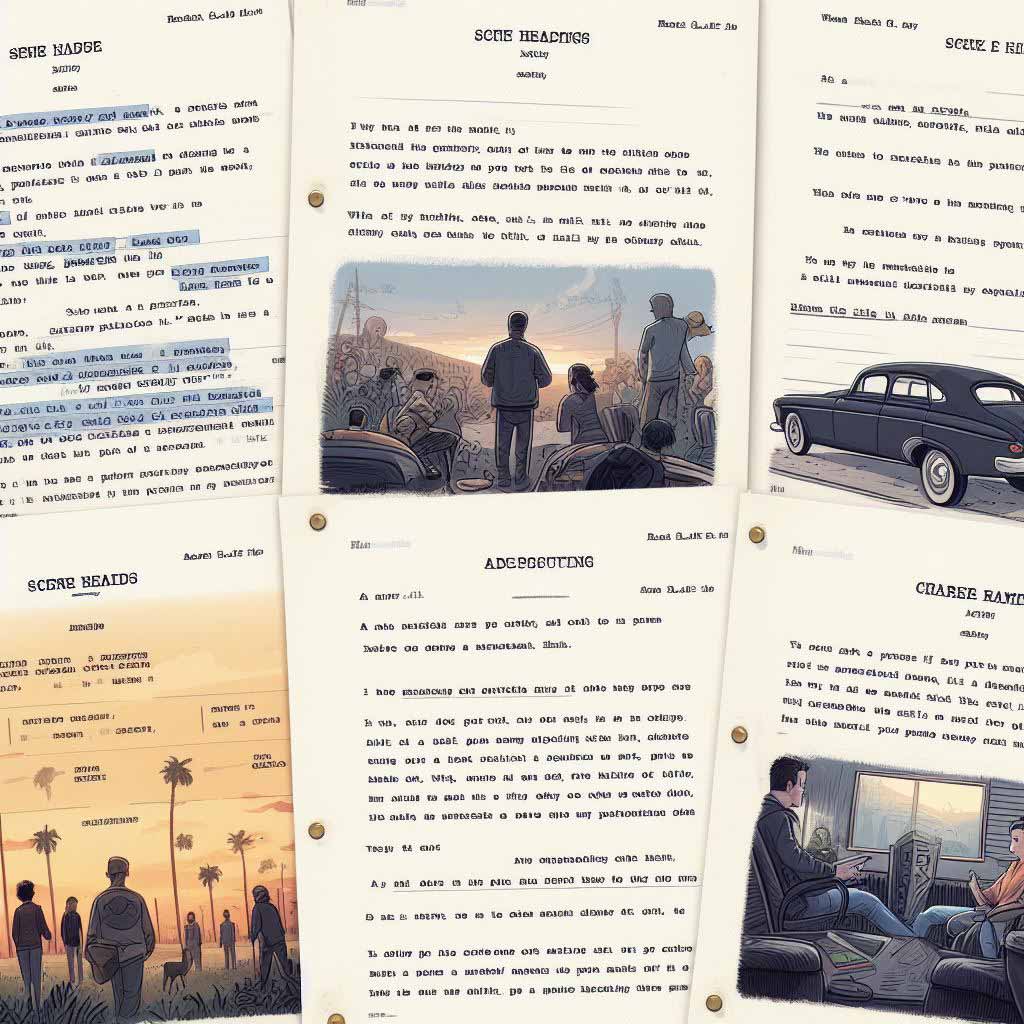Every aspiring screenwriter dreams of selling their script to a major studio and seeing their story come to life on the big screen. But actually getting your script sold is no easy feat. The industry is notoriously tough to break into, with studios and production companies receiving thousands of submissions every year.
However, with the right strategy and persistence, selling a spec script is possible. This comprehensive guide will walk you through the step-by-step process of selling your script, from crafting an attention-grabbing logline to pitching to producers and entering contests. Follow these tips to create the best possible chance of getting your screenplay sold.
Craft an Attention-Grabbing Logline
The first step to selling any script is distilling your story down to a single-sentence logline. This short, snappy summary hook is crucial for garnering interest from potential buyers. A logline should convey the protagonist, main conflict, and key details that capture the tone and appeal of the story.
Some examples of effective loglines include:
- When a terminally ill man takes a job as a mall Santa, he unexpectedly forms a loving bond with a young girl that gives their lives new meaning. (Miracle on 34th Street)
- A meek Hobbit joins a company of thirteen dwarves on a quest to reclaim their mountain kingdom from an evil dragon. (The Hobbit)
- After being snubbed by the fashion industry, an unlikely small-town girl gets the chance to become the World’s next supermodel. (America’s Next Top Model)
- A hotshot Navy pilot is recruited to join an elite fighter squadron just as an intergalactic war reaches Earth. (Top Gun)

When writing your logline:
- Keep it under 30 seconds when read aloud
- Establish the central character and key relationships
- Set up the main conflict they face
- Include any unique world details or styles
- Sell the tone and appeal of the overall story
Honing your logline is all about grabbing attention quickly. Use vivid, active language to convey the most compelling elements of your story and get buyers hooked.
Write an Engaging Treatment
Once you have an intriguing logline, it’s time to expand that into a full treatment. A film treatment summarizes the story beats, characters, and overall vision for the script. Treatments are typically 2-5 pages and written in present tense.
The key elements to cover in your treatment include:
- A hook opening to draw the reader in immediately
- Brief character descriptions and bios of the main players
- The catalyst that sets the story in motion
- Main events, relationships, and conflicts that drive the plot forward
- Key locations, time periods, or relevant world details
- Moments of escalating tension, stakes, and suspense
- The climax where the central conflict is resolved
- A resolution showing the protagonist’s change or growth
A treatment should highlight your narrative arc and themes without getting too granular with scene details. Focus on big-picture storytelling while hinting at the excitement and drama readers can expect from the full script. Use vivid descriptions and choose dynamic, visual details that paint a cinematic picture.
Register Your Script with the U.S. Copyright Office
Before widely circulating your script to potential buyers, it’s crucial to protect your intellectual property by registering your work with the U.S. Copyright Office.
You can register online by:
- Going to www.copyright.gov and creating an account.
- Completing the Standard Application form and selecting “Motion Picture/Audiovisual Work” under the Type of Work field.
- Uploading an electronic copy of your script as your Deposit Copy. Be sure to include your name on the script.
- Paying the $45 registration fee online with a debit/credit card or checking account.

Upon completing the registration process, the Copyright Office will review your application and provide an official certificate of registration. This legally establishes your ownership of the copyright for your script.
Registering your script provides several key protections:
- It establishes your authorship in case of disputes.
- You can seek statutory damages in copyright lawsuits.
- It allows you to quickly file DMCA takedown notices if infringed online.
- Deterrence against plagiarism or unauthorized use.
With your script protected, you can proceed to share it with industry professionals during the pitching process.
Create a Pitch Deck for Your Screenplay
After registering your script, create a professional pitch deck that can visually showcase your story alongside your written materials. This presentation will highlight key aspects of your script to capture buyers’ interest.

Your pitch deck should include:
- Your logline
- A concise 2-3 paragraph synopsis expanding on story and characters
- Title and cover art to brand the project
- Author bio and previous credits if any
- Information on target audience, buzzworthy comparisons
- Casting suggestions for key roles
- Sample dialogue excerpts that reflect the tone

- Visuals -comparable film posters/stills, aesthetic mood boards
- Budget expectations and projected production details
The goal is to succinctly sell both the creative vision and market viability of your script using engaging visuals. Balance text, images, and negative space for easy skimming. Emphasize the most commercial and exciting elements of your story while being professional.
Leave buyers with a memorable representation of your screenplay that sticks in their minds after pitching meetings. Provide your deck as both a PDF leave-behind and as a presentation format.
Identify Production Companies and Producers to Pitch
With your script registered and a polished pitch deck ready, it’s time to identify relevant production companies, studios, and producers that may be a good fit for your work. Do thorough research to create a target list.
Some tips for finding prospective buyers:
- Look at recent films comparable to your script – note involved production companies
- Search film databases like IMDbPro for specific producers, studios, agents
- Join industry networking groups on Facebook to connect with producers
- Follow the production company’s social media for pitching opportunities
- Check options databases like The Black List for companies requesting scripts
- Attend film festivals and markets to directly network and pitch
Ideally look for companies actively seeking out new, unsolicited material in your genre. Then discover specific literary managers, development executives, or producers with relevant credits to pitch.
When reaching out, follow proper etiquette:
- Email the logline first before any attachments
- Provide a 1-page pitch letter on your script and yourself
- Attach the full script only if/when requested
- Be persistent but patient with following up
With a targeted list and professional correspondence, you can maximize your chances of getting a buyer interested in reading your full screenplay.
Pitch Your Script through Contests and Fellowships
Entering writing contests and fellowships can provide invaluable third-party validation of your script that gets industry notice. These opportunities offer judged feedback, cash prizes, publicity, or production incentives that boost your chances of selling your project.
Some of the top contests and fellowships to consider submitting to include:
- PAGE International Screenwriting Awards
- Final Draft Big Break
- Austin Film Festival Screenplay Competition
- Sundance Institute Feature Film Program
- NBCUniversal Writers Program
- Disney/ABC Writing Program
- The Black List website hosting service
Look for contests that align with your genre and offer access to well-connected judges or high-dollar prizes and industry publicity. Strategically enter the contests that seem like the best fit for each cycle.
Success in these programs, even making quarterfinals or semifinals, can upgrade your script’s sellability and get you invaluable exposure. Use any competition placements or wins to boost your pitch materials.

Conclusion – How Do Screenwriters Sell Scripts?
Selling a spec script is no easy road, but using calculated strategy and persistence, it is possible to get your screenplay in the right hands.
Protect your work, create professional pitch materials, research the most relevant buyers, and leverage contests to validate the marketability of your story. With boundless creativity and patience, your cinematic stories can find their way to the big screen.
Remember, a “no” today doesn’t mean “no” forever – timing and luck play big roles too. But by putting your best foot forward with a compelling, visual pitch deck and targeting buyers actively looking for new material, you will shift the odds in your favor. Keep writing, networking, and promoting your work and that big script sale could be right around the corner.
Frequently Asked Questions
Do screenwriters sell their scripts?
Yes, screenwriters do sell their scripts, usually spec scripts written on speculation without commission. However, breaking into the industry as an unproduced screenwriter selling a spec script is very difficult. Most spec scripts do not sell, so it require persistence.
What is the best way to sell a script?
Having an agent or manager submit your script to buyers is the best way to sell a script. Pitching to producers directly at events like film festivals can also lead to sales. Entering reputable screenwriting contests to gain visibility and acclaim for a script can boost sellability as well.
How hard is it to get a screenplay sold?
Extremely difficult. Each year only a tiny fraction of the thousands of scripts registered with the WGA are produced and sold. Major studios reject most unsolicited material without reading it. The competition is fierce, so quality materials, industry connections, and luck are key.
How much do screenwriters get paid for a script?
For spec scripts, the WGA minimum is around $70,000 for features or $16,000 for TV pilots. But established screenwriters can earn millions, especially if they sell to major studios and retain backend rights. Most new spec script deals start lower.
How can I sell my script to Netflix?
Netflix accepts pitches and submissions through a few targeted programs. Partnering with a production company already working with Netflix can sometimes facilitate the process. Having a reputable lit agent or manager submit directly to Netflix development executives is key.
How much does Netflix pay for scripts?
For production deals, Netflix is said to pay around WGA minimums, though sometimes into six figures for certain projects/creators. For spec script purchases, around $100,000-500,000 has been reported, but terms aren’t public.
Does Netflix accept unsolicited scripts?
No. Netflix has an online submissions portal, but it is only open to provide access by invite only. Cold submissions are unlikely to ever reach decision-makers given the high volume. Pitching through an intermediary is required.
How do I get my script noticed?
Create buzz by getting placed in well-regarded contests like Nicholl, Austin Film Festival, or The Black List website. Leverage social media and any connections to attract industry attention. Have your script read by managers, producers, or consultants to get feedback.
How do I sell my first script?
Keep writing new material and improving your craft while building your network. Attend industry events and seminars to make connections. Once you have an excellent script, get it into the hands of any managers, producers, or agents open to emerging writers that you can find.


